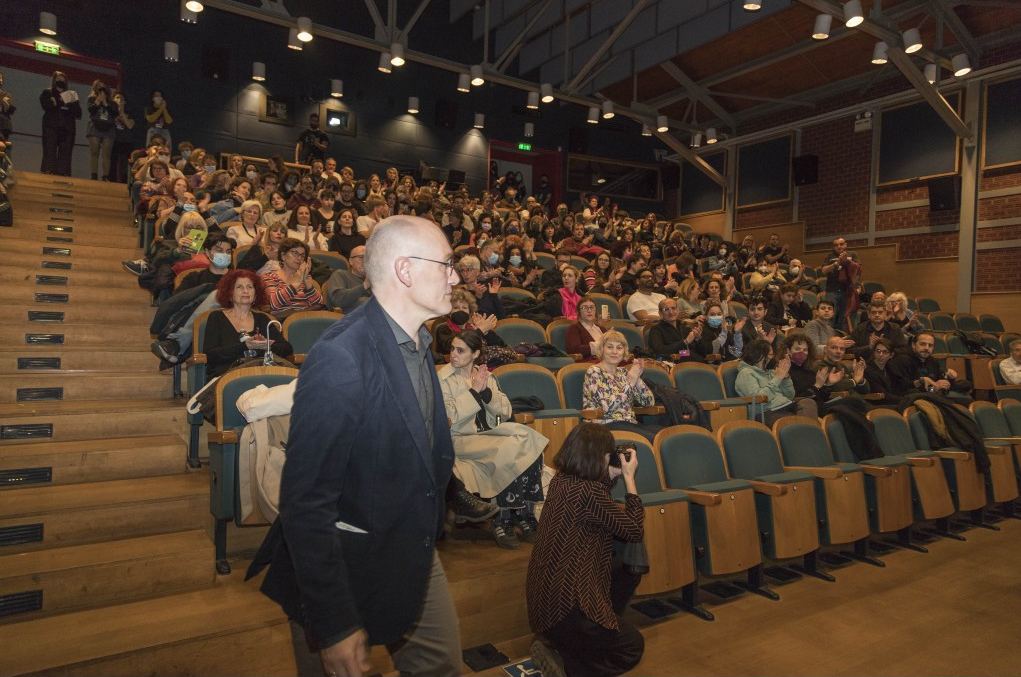Screening of the film The Super 8 Years – Q&A with David Ernaux-Briot
The documentary The Super 8 Years by Annie Ernaux and David Ernaux-Briot, a retrospective on the memories and experiences of Nobel Prize-winning author, Annie Ernaux, was screened on Friday, March 10th, at the 25th Thessaloniki Documentary Festival, in the presence of her son and co-director, David Ernaux-Briot.
The French author, who was awarded the Nobel Prize in Literature in 2022, tests her narrative tools through a different medium with this film and invites us on a treasure hunt through a tender journey into her family’s innermost memories.
The artistic director of the Festival, Orestis Andreadakis, welcomed co-director David Ernaux-Briot, saying: "About a year and a half ago, we kicked off the Festival with the screening of the excellent film The Event, which was based on a book by Annie Ernaux. Then Ms Ernaux was awarded the Nobel Prize and now we are presenting a film she has made with her son about their lives."
David Ernaux-Briot then took the floor. "I am very, very happy to be here today. I would like to thank the Festival for the invitation as well as all of you who are here. Four or five years ago, my son asked to see scenes from our life when I was young. My father and I used to film with a Super 8 camera. We sat down and watched all these scenes that my dad had shot with the camera. My mother then decided that we could make a film that would chronicle our lives. I wanted to create something of quality, as I had good material to work with. My mother created the text which is the narration we hear in the story. We recorded it in the early days of the first lockdown, in 2020. The scenes come only from material my father had recorded. The voice you will hear is my mother's and I sincerely hope you like it."
After the screening of the film, a Q&A with Mr. Ernaux-Briot followed. In response to a question from the audience about the editing, the director stated: "The editing is a product of the text my mother wrote. The text we heard is not a commentary on the images, but the opposite. At first, my mother wrote a text for a one-hour film. We had a total of five hours of material in our possession. In the end, the film does indeed last one hour. Of course, we had to organize all these images in a certain way and the truth is that we were forced to leave some scenes out of the film, although there might have been important comments and information in them. It's based on a literary text, so we cut out material that didn't fit the narrative and the imagery. I'm a journalist and that's exactly what I do in my job. I have a text first and then I try to match images based on and driven by the text. We worked within this framework, as if it was a reportage. We tried to keep the narration uninterrupted by the images."
As for whether there was any other way to organize the film, David Ernaux-Briot said: "No, I never thought of another way. The structure of the film was very specific and was planned from the beginning. I wanted to achieve autonomy in the text and image and achieve interaction between them. I never thought of interviewing my mother. What I wanted was her own literary text, which, as I said, she wrote during the first quarantine at home. There are no other external images, such as television images of the era, and we have not added any other music. I wanted the interaction of image and voice."
When asked why he decided to make private moments of their family public through the film, Ernaux-Brio explained: "The film is based on my mother’s life. Her wishes, the battle she was fighting at the time, and the truth is that it coincided with the awarding of the Nobel Prize in Literature." He added: "I don't feel that I share too many private moments with the world, especially my own. Maybe a few more of my mother's. She was the one controlling and deciding where to focus in relation to the footage my father had shot. Something that I really liked in the movie and was interesting to me was my aunt. She lived in nature with a more simplistic way of life and didn't want to return to a capitalist system. I wish we had more material with her. For me, this movie is an example of how a family lived in the 70s. We see my brother, my mother, myself, but the truth is that even if I used material from other archives, from another family, the result would be the same."
Concluding the film's presentation, the director noted: "It's wonderful to see young people in the theater today. t is very important to transmit these memoirs of the 70s, which express the need for liberation, social progress, and the creation of a better and fairer world for the future. The political struggle was intense in the 70s and that struggle continues even today."















